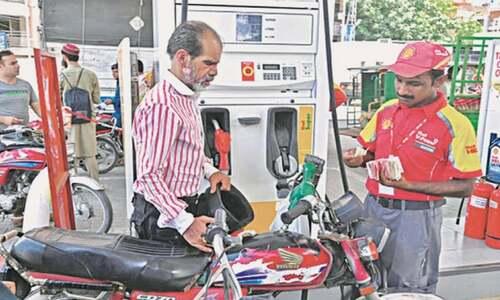 HUNZA, June 16: The United Nations Development Programme (UNDP) has selected Passu and Ghulkin glaciers for conducting research on glacial changes caused by global warming.
HUNZA, June 16: The United Nations Development Programme (UNDP) has selected Passu and Ghulkin glaciers for conducting research on glacial changes caused by global warming.
Due to climate change glacier lake outburst floods (GLOFs) have recently hit three villages disrupting life and communication in Gojal tehsil.
Amber Masud, project support officer of Regional GLOF Risk Reduction Initiative, UNDP, told Dawn on Monday that Passu and Ghulkin glaciers had been selected for the research project. However, the project has not yet been started at the glaciers.
She said UNDP would implement the project in collaboration with the National Disaster Management Authority and FOCUS Humanitarian Assistance in a few days.
A number of villages in Gojal tehsil, home to many glaciers including Batura (57km) in Passu, which is one of the world’s longest and largest glaciers outside polar region, Verjerav glacier in Shimshal, and Ghulkin glacier have witnessed dramatic changes in recent years.
A glacier lake outburst flood (GLOF) on June 14 hit Ghulkin village, some 135km north of Gilgit, causing massive damage to houses, cattle pens, potato and wheat crops, orchards and irrigation channels and blocked Karakoram Highway (KKH) suspending trade and traffic between Gojal and rest of the district.
Similar GLOFs on May 21 and 25 at the same point had caused huge damages to the public property and the KKH.
Meanwhile, Gilgit Deputy Commissioner Mohammad Usman Younis and Hunza Assistant Commissioner Soqrat Aman Rana visited the flood affected Ghulkin village on Sunday and distributed relief goods among the people affected by the glacier lake outburst floods.
The relief goods comprised three tents, rice, 100kg sugar and cooking oil.
The local community termed the relief goods as peanuts and asked the officials to make assessment of the actual loss.
Fazal Karim, a local community representative, briefed the officials about the damages caused by GLOFs on May 21, 25 and June 14.
He said about 20 families had lost most of their cultivable land, houses, cattle pens, orchards and forest trees and almost 6,500 population of Ghulkin, Hussani and Borith villages were still prone to the danger posed by glacial changes in Ghulkin and Passu.
Aziz Jan, Chairman Union Council Gulmit urged the Prime Minister Yousuf Raza Gilani, Pakistan People’s Party co-chairman Asif Ali Zardari and PML-N Quaid Nawaz Sharif to take stock of the situation and ask the local administration to take measures for the rehabilitation of the affected people and mitigate the losses.
He demanded that the local administration should conduct a scientific study of the movement of glaciers in the region due to climate change to devise a comprehensive strategy to avoid any disaster in the region.
The Gilgit district commissioner in response to the demands said they had no funds to immediately respond to natural calamities. He said disaster management plans had been developed at district level and would be implemented after approval by relevant authorities.
The official said he had submitted reports to National Disaster Management Authority for further action.
People criticised the government and local administration for their indifferent attitude in responding to the situation and conducting risk assessment survey, developing disaster management strategy for the disaster prone villages surrounding Ghulkin and Passu glaciers.
The deputy commissioner, however, said an expert from UNDP had already visited Ghulkin and Passu glaciers to make a risk assessment for the surrounding villages.
Local people claimed that due to climate change many small and big lakes had been formed in the Ghulkin glacier posing great danger to the residents in Ghulkin, Hussani and Borit villages.
Despite such alarming situation, there has been no serious effort from Northern Areas administration to assess the damages and devise any strategy to avoid any disaster in future.
The local people urged the government to send experts to monitor changes in the movement of glaciers and dangers posed by them to the area.












































Dear visitor, the comments section is undergoing an overhaul and will return soon.